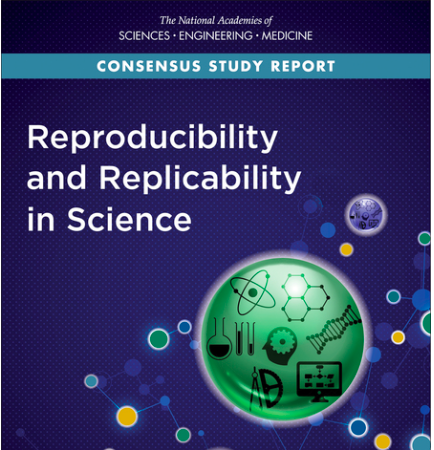New Report: Reproducibility and Replicability in Science

Report cover: "Reproducibility and Replicability in Science," consensus study, 2019
Prof. Barba is a co-author of the National Academies study report on "Reproducibility and Replicability in Science." The National Academies of Science, Engineering and Medicine (NASEM) carried out this study on commission from the National Science Foundation, with additional sponsorship from the Sloan Foundation. This report presents the consensus of the committee and is the result of half-a-dozen in-person meetings, multiple teleconferences, and months of collaborative writing. The general conclusion of the report can be summarized in the short mantra:
No crisis, no complacency.
Description
One of the pathways by which the scientific community confirms the validity of a new scientific discovery is by repeating the research that produced it. When a scientific effort fails to independently confirm the computations or results of a previous study, some fear that it may be a symptom of a lack of rigor in science, while others argue that such an observed inconsistency can be an important precursor to new discovery.
Concerns about reproducibility and replicability have been expressed in both scientific and popular media. As these concerns came to light, Congress requested that the National Academies of Sciences, Engineering, and Medicine conduct a study to assess the extent of issues related to reproducibility and replicability and to offer recommendations for improving rigor and transparency in scientific research.
Reproducibility and Replicability in Science defines reproducibility and replicability and examines the factors that may lead to non-reproducibility and non-replicability in research. Unlike the typical expectation of reproducibility between two computations, expectations about replicability are more nuanced, and in some cases a lack of replicability can aid the process of scientific discovery. This report provides recommendations to researchers, academic institutions, journals, and funders on steps they can take to improve reproducibility and replicability in science.
Citation
- National Academies of Sciences, Engineering, and Medicine. 2019. Reproducibility and Replicability in Science. Washington, DC: The National Academies Press. https://doi.org/10.17226/25303.
Release webinar
Public Release of the Reproducibility and Replicability in Science Report from The National Academies on Vimeo.
Media coverage
- "Science needs to improve the transparency of research results, says report" on Physics World, 8 May 2019.
- "New report recommends greater transparency in research" on GW Today, 9 May 2019.
- "Scientists must take steps to improve reproducibility and reliability of research results" on Chemical & Engineering News (C&EN), 9 May 2019.
- "The National Academies illustrates the more nuanced value of transparency in science" on the blog of the Union of Concerned Scientists, 13 May 2019.
On Twitter
Now out! New report examines Reproducibility and Replicability in Science, with recommendations for researchers, agencies, policy makers, journals, etc.@theNASEM https://t.co/fUWOztdKAV#ReproducibilityInScience https://t.co/hkiWJdZ0yd
— Lorena Barba (@LorenaABarba) May 7, 2019
https://twitter.com/LorenaABarba/status/1125793792223850496?s=20
Our study report on "Reproducibility and Replicability in Science, covered by @GWToday https://t.co/40aSpD2ltt #ReproducibilityInScience @theNASEM
— Lorena Barba (@LorenaABarba) May 9, 2019
Our report on Reproducibility and Replicability in Science released yesterday, covered by @physicsworld https://t.co/ikAg8s1vsn #ReproducibilityInScience
— Lorena Barba (@LorenaABarba) May 8, 2019
Our report says that people should seek evidence when contemplating a serious decision or policy based on results of a single study. Read more recommendations: https://t.co/6FINlg8tge #ReproducibilityInScience pic.twitter.com/cfFINa6qf7
— National Academies (@theNASEM) May 11, 2019